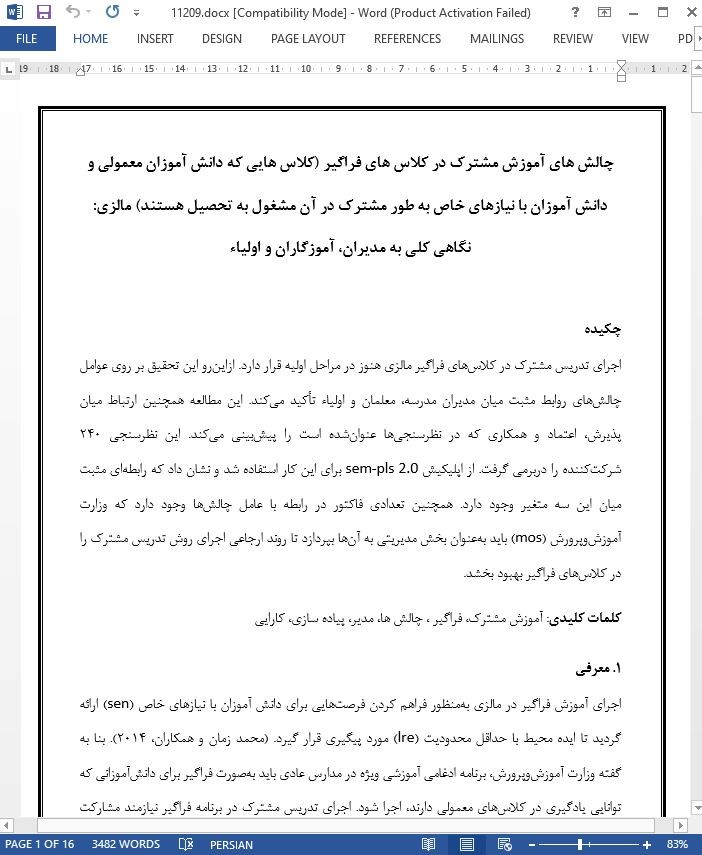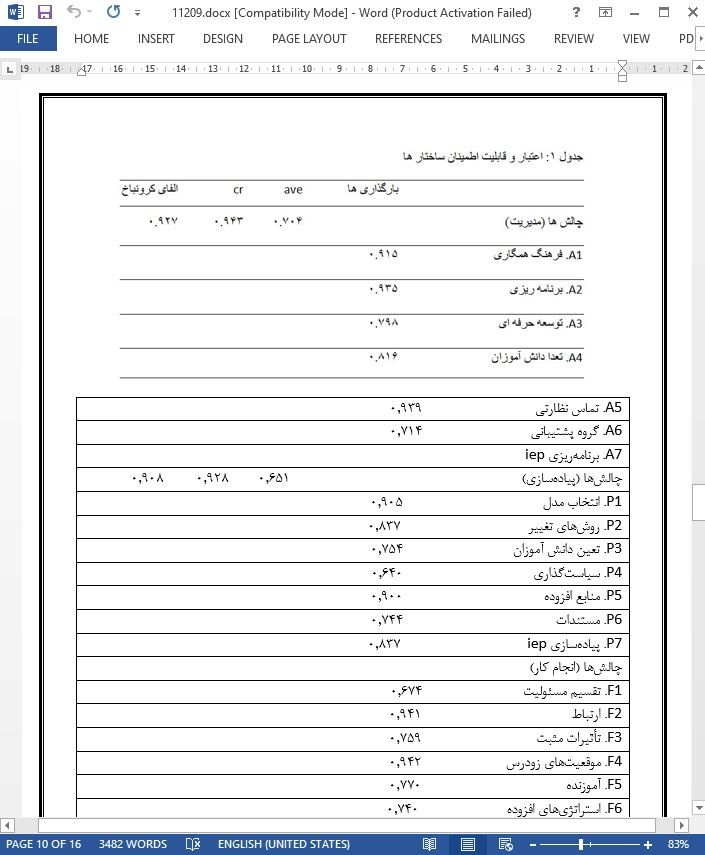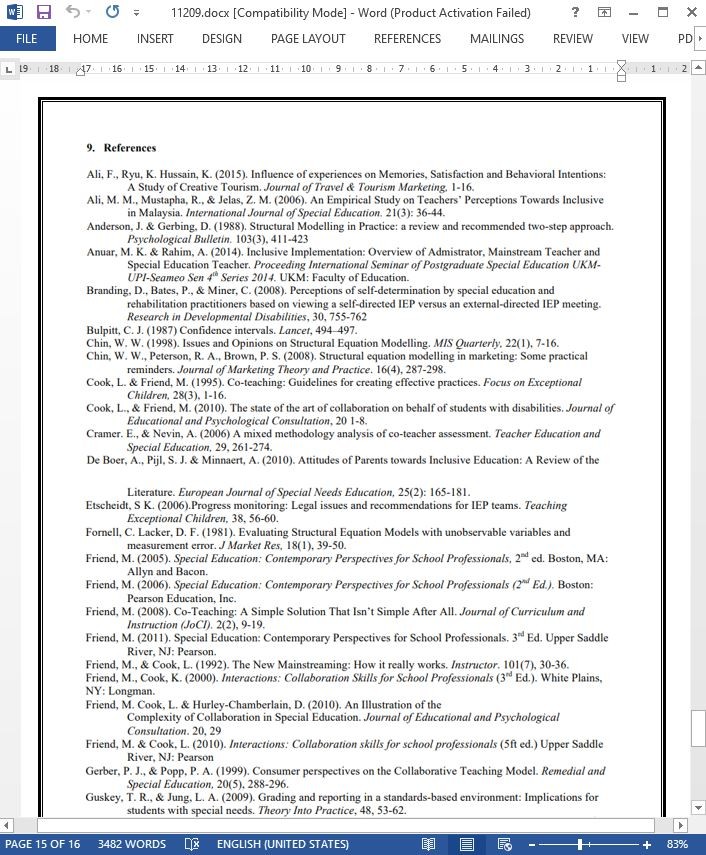
چالش های آموزش مشترک در کلاس های فراگیر مالزی
چکیده
اجرای تدریس مشترک در کلاسهای فراگیر مالزی هنوز در مراحل اولیه قرار دارد. ازاینرو این تحقیق بر روی عوامل چالشهای روابط مثبت میان مدیران مدرسه، معلمان و اولیاء تأکید میکند. این مطالعه همچنین ارتباط میان پذیرش، اعتماد و همکاری که در نظرسنجیها عنوانشده است را پیشبینی میکند. این نظرسنجی 240 شرکتکننده را دربرمی گرفت. از اپلیکیش sem-pls 2.0 برای این کار استفاده شد و نشان داد که رابطهای مثبت میان این سه متغیر وجود دارد. همچنین تعدادی فاکتور در رابطه با عامل چالشها وجود دارد که وزارت آموزشوپرورش (mos) باید بهعنوان بخش مدیریتی به آنها بپردازد تا روند ارجاعی اجرای روش تدریس مشترک را در کلاسهای فراگیر بهبود بخشد.
1. معرفی
اجرای آموزش فراگیر در مالزی بهمنظور فراهم کردن فرصتهایی برای دانش آموزان با نیازهای خاص (sen) ارائه گردید تا ایده محیط با حداقل محدودیت (lre) مورد پیگیری قرار گیرد. (محمد زمان و همکاران، 2014). بنا به گفته وزارت آموزشوپرورش، برنامه ادغامی آموزشی ویژه در مدارس عادی باید بهصورت فراگیر برای دانشآموزانی که توانایی یادگیری در کلاسهای معمولی دارند، اجرا شود. اجرای تدریس مشترک در برنامه فراگیر نیازمند مشارکت معلمان و مدیران میباشد (فرند، 2008). به نظر میرسد که اجرای آموزش فراگیر بدون وجود برخی چالشها بهطور کامل انجام نمیگیرد و این مسئله باید مورد تأکید قرار گیرد. بنا به گفته فرند (2006)، موراوسکی (2008) و اسکروگز (2007)، آموزش فراگیر باید با اجرای روش تدریس مشترک انجام گیرد تا دانش آموزان با نیازهای خاص را هم شامل شده و امکان بهرهمندی مداوم از مزایای موجود را در اختیار آنها قرار دهد (ریتیوارا، 2012).
8. بحث و نتیجهگیری
پیادهسازی و انجام تدریس مشترک بسیار چالشبرانگیز بود. در این تحقیق دیدگاه سه گروه موردبررسی قرار میگیرد. مدیران، آموزگاران و والدین افرادی هستند که موفقیت رویکرد تدریس مشترک را تعیین مینمایند. فرهنگ همکاری میان تمام طرفهای درگیر و فعال کردن تمام آنها با برنامهای طراحیشده امکانپذیر است چراکه در این شرایط رضایت مدیران، آموزگاران و والدین بهخوبی فراهم میشود. این تغییر فرهنگ ساختار باعث ایجاد همکاری در پیادهسازی iep میگردد (برندینگ و همکاران، 2008) چراکه آموزگاران در نقش مجری این روش ظاهر شده و والدین نیز شاهد تغییر و ارتقاء کیفیت iep بوده و آن را روشی مؤثر مییابند. این تحقیق مدل تدریس مشترک را که در مالزی پیادهسازی شده است را ارائه میدهد.
Abstract
The implementation of co-teaching in the inclusive classrooms in Malaysia is still in the earliest of stages. Hence this study highlighted the element of challenges in terms of positive relationship among school administrators, teachers and parents. This quantitative study also predicted the relationship by the spirit of acceptance, trust and cooperation stated in the questionnaires. It involved 240 respondents in Malaysia. The application of SEM-PLS 2.0 was used and the study showed that there is a positive relationship between the three variables. There are also few factors from the element of challenges that need to be addressed by the Ministry of Education (MOE) as an administrator to improve the referral process of implementing the co-teaching approach in an inclusive classroom.
1. Introduction
The implementation of inclusive education in Malaysia has been introduced to provide opportunities for students with special educational needs (SEN) to follow the concept of least restrictive environment (LRE) (Mohd Zaman et al., 2014). According to the MOE (2013), Special Education Integration Program in the mainstream schools has to implement an inclusive program for students who are able to learn in the mainstream classes. The implementation of co-teaching in an inclusive program requires active involvement of teachers and administrators (Friend, 2008). The implementation of inclusive education seems to be incomplete in the absence of challenges and it should be emphasized. According to Friend (2006), Murawski (2008) and Scruggs et al (2007), inclusive education should be resolved with the implementation of co-teaching approaches, including the SEN which would benefit more consistently (Rytivaara, 2012).
8. Discussion and Conclusion
It was challenging regarding the implementation of co-teaching. In this study the views of three parties are measured. Administrators, teachers and parents is what determines the success of co-teaching approach. A culture of collaboration among the parties involved in enabling all parties are satisfied with the program designed because it involves consenting administrators, teachers and parents. Acculturation involves the construction of collaboration in the implementation of the IEP (Branding et al., 2008) because teachers act as executor and parents see the changes and improvement in the quality of the IEP as a successful way. This study introduces the co-teaching model implemented in Malaysia.
چکیده
1. معرفی
2. چالشهای اجرای تدریس مشترک
2.1 چالشهای اجرا
2.2 چالشهای مدیران
2.3 چالشهای اولیاء
3. روش تحقیق
3.1 ابزار تحقیقاتی
3.2 شرکتکنندگان
3.3 تحلیل دادهها
3.4 نتایج
4. جمعیتشناسی
5. چارچوب تحقیقات و نظریهها
6. مدلهای اندازهگیری
7. مدل ساختاری
8. بحث و نتیجهگیری
Abstract
1. Introduction
2. The implementation of co-teaching challenges
2.1. Implementation challenges
2.2 Administration challenges
2.3 Challenges on Parents
3. Research Method
3.1 Research Instrument
3.2 Respondents
3.3 Data Analysis
3.4 Results
4. Demographic
5. Research Framework and Hypotheses
6. Measurement Model
7. Structural Model
8. Discussion and Conclusion
- اصل مقاله انگلیسی با فرمت ورد (word) با قابلیت ویرایش
- ترجمه فارسی مقاله با فرمت ورد (word) با قابلیت ویرایش، بدون آرم سایت ای ترجمه
- ترجمه فارسی مقاله با فرمت pdf، بدون آرم سایت ای ترجمه



